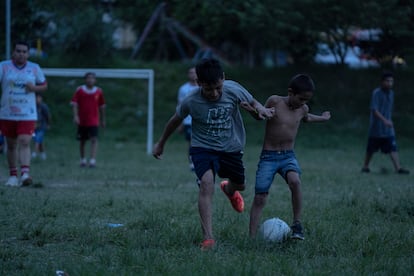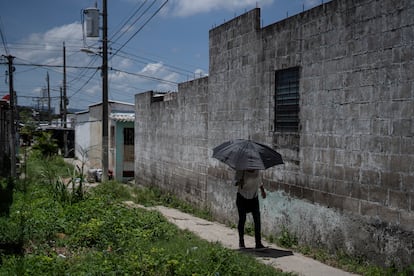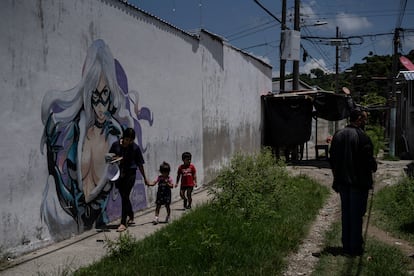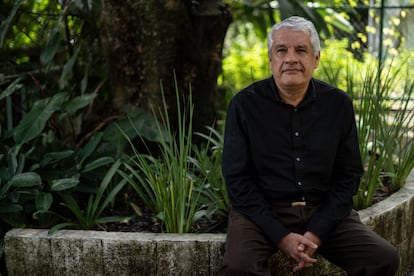El Salvador: The hell of the innocent sent to prison on an anonymous phone call
President Nayib Bukele’s government has opened a hotline for people to report gang ‘collaborators.’ Many Salvadorans have taken advantage of that resource to settle personal vendettas with their neighbors

See. Hear. Whisper. Speak in a low voice to avoid being heard. Anonymously denounce one’s neighbor. The omertà or code of silence that the gangs had imposed on Salvadorans—see, hear and shut up—has been transformed into a new common practice in El Salvador, one that sends alleged gang collaborators to jail based on anonymous calls to the police. Many of those who have ended up in jail accused of “criminal association” were denounced by their own neighbors. Many of them are also innocent of that charge. President Nayib Bukele’s government has created a social base of citizens who have become informers, snitches, avengers, a common feature of authoritarian regimes that extend their tentacles into the depths of society through multiple sets of eyes and ears ready to watch others and then turn them in to the authorities. Each person carries a gendarme within.
This policy of enmity has shattered community ties and trust among citizens. The worst effect is the imprisonment of innocent people without connections to the gangs, as many people have conveniently used the state of emergency to settle old scores and exact personal revenge, as EL PAÍS has documented. In these cases, the parties are not criminals but ordinary people—mostly poor youths—who had the misfortune of being disliked by others. A phone call was all it took. Experts point out that the ways in which this new regime sows hostility is reminiscent of the civil war era (1979-1992), when the repressive government encouraged citizens to turn in insurgents and their supporters.
In the Las Margaritas neighborhood, once a stronghold of the Mara Salvatrucha 13 (the MS-13 gang), a man speaks of how the urban landscape has changed since Bukele’s government wiped out the gangs. At the stroke of 6 p.m., the streets are alive. A 60-year-old man walks his dog while neighborhood youths play a soccer game. The stores are open; the pupusa shops are busy. At one point, the man looks over his shoulder and lowers his voice. He notices that about ten feet away from him, there is another guy, about his own age, sitting quietly on the sidewalk.
-Look…that one is a collaborator,” he whispers.
-How did he collaborate?
-He gave them money.
Under a regime where suspicion reigns, there is no distinction between a person who “financed” gangs and another who was forced to pay them extortion money. In both cases, the gangs used these payments to support their illicit activities. The man from Las Margaritas said that his wife had also been denounced anonymously but she was not charged with a crime, he said. For him, that showed that only the guilty go to prison.
-No one is taken to prison for being innocent. The person who is taken [to jail] is [arrested] because he [has done] something,” he says. Those who complain about the regime do so because their children were involved with the gangs. The parents are enablers. You have to be tough with your children. I talked to my children and told them: ‘If you commit an offense, and the law takes you to jail, I am not going to visit you in jail. Do your time…because you have made the mistake. I did not tell you [to do that].’”

In May 2022, less than two months after the beginning of the state of emergency, the Bukele government set up hotline—the number to dial is 123—so that people could give anonymous tips, thereby helping to “bring more terrorists to justice.” In theory, the National Police investigates each report and, based on intelligence work, determines whether the person reported is or has been a “collaborator” of Mara Salvatrucha 13 or Barrio 18 [Neighborhood 18], the two gangs that have terrorized El Salvador for 25 years. Civil organizations point out that anonymous accusations have become a staple of the criminal dossiers put together by the Bukele government.
Most of the detainees are young people from poor neighborhoods. The opinion among human rights defenders is similar: there are some towns that lack water and electricity, but the regime of exception still manages to extend the long arm of the law there; the only people who are more or less safe from this phenomenon are those who live in wealthy neighborhoods. The regime, as Salvadorans call it, likes to feed on invisible marginalized people. “You cannot defend yourself. If you try to defend yourself, you are considered to be doing something wrong, and they take you away. That’s the regime. You can’t talk about your rights, because you don’t have any,” says a woman whose relative was arbitrarily detained.
“I told my mother that I would be back, but that was a lie”
“They accused me through an anonymous phone call,” says a 26-year-old shopkeeper in San Salvador. “They took me out of my house. I was on my way to work. In the police report, they said that they had caught me in another place, that I was with a small group of people from the MS[-13]. I asked the Attorney General’s Office to correct that, because they took me out of my house, and I don’t know those people”. The woman, who has requested anonymity, is one of the lucky few to be released after spending six months in the Ilopango women’s prison and then the Apanteos prison. In July 2022, on the day she was arrested, the police also took her 23-year-old brother into custody; he was held in the maximum-security prison created by Bukele, known as the Terrorism Confinement Center (Centro de Confinamiento del Terrorismo, CECOT). Salvadorans know that once a person is taken to this prison, they will not get out again, even if they have not been sentenced.
“When they came to my house, they asked me for my name…[and] my ID. They told me, ‘You don’t appear in the system; let’s go [to the police station] to see what happened.’ I told them I was fine. Before I left I told my mom, ‘I’ll be right back.’ But that was a lie. I didn’t come back,” she says. The saleswoman left behind her one-year-old son, whom her mother took care of while she was in prison. “In there, I met several women who also ended up there because of a phone call. Many who weren’t involved in anything, nothing at all,” she says. “If a person didn’t like you, after one phone call, they would bring you in, without any more proof.”
-Did you ever find out who accused you?
-Ugh, yes. And that girl is still bothering me,” says the woman. The policeman who arrested me told me that she insisted and insisted that I be brought in. She called several times. And after I was released, she called again…She even posted it on Facebook. That’s why I was arrested”.

They haven’t heard anything from her brother, who has been in prison for over a year. “Nothing is known about the inmates there. You can’t even find out if the person is okay… or if he needs anything. It is impossible to communicate with [one’s] family when you’re in there,” says the saleswoman. Thousands of people have been detained under the suspension of rights during the emergency regime, which has been in effect for 17 months. The authorities acknowledge that 6,000 detainees were innocent and claim that they have already been released. But the Socorro Jurídico [Legal Aid] organization points out that there are still 14,000 people in prison who have never been connected with a gang.
“There is an ad that encourages people to turn others in. Relax, if you denounce [someone], no one will know. And, essentially, you pick up a phone, you don’t have to identify yourself, and that’s enough…for the police to…take someone away,” says Ingrid Escobar, director of Legal Aid. “If there are family problems, someone can be accused during a moment of anger. Or because of problems with neighbors, emotional situations, rancor after a fight with someone. We have many cases like that,” she says.
Escobar talks about the case of a woman who was denounced by her own partner. “She is a poor girl who left behind five children. This woman was beaten by the father of her children. She had an emotional relationship with the pastor of her church. Out of jealousy, the husband accused her in an anonymous phone call. The woman has been detained for 15 months, her children are in different places, and we don’t even know if she is alive. This is just one example. The regime is used for that too, it gives that possibility. There are no guarantees to ensure that only criminals are charged,” she says.
“The regime doesn’t go into rich neighborhoods”
This newspaper also spoke with a university professor whose wife was arrested in August 2022. The woman was lying in the hammock breastfeeding her 13-month-old son when police raided her home, took her away from her baby and arrested her. “A neighbor made an anonymous call. [It was because] I set up a little shop for my wife. The next-door neighbor also had a store, and we were doing well. It was out of envy…May God watch over people,” the man says.
The woman was accused of belonging to Barrio 18. I am a university professor. I have supported my wife for seven years. Here is my son. I show my face. My wife and I are honest people. They came to get her from my house, she wasn’t with anyone else,” he says. “And at the police station they told me that she will never see the light of day again. It broke my heart.”
His wife, who was 29 years old at the time, was imprisoned at the Apanteos prison. Thanks to a public defender, she was given a medical examination. She was diagnosed with schizophrenia, severe anxiety, hypertension, scabies and a suicide attempt. The public defender advised the man to move to a different neighborhood, because the place where he now lives is strongly associated with gangs, a prejudice that affects the authorities’ decision. “He told me that I had to move to an area that is not considered [a hotspot of gang activity], to change my wife’s profile. Change her profile? Just because I live where I live? What does that have to do with it? I don’t have the resources to move to a rich neighborhood. That’s not where the regime goes. [The authorities] go where the vulnerable people live, the poor people. Yes, there we are all [considered] delinquents,” he complains.
His wife has been in prison for a year. The man’s mother takes care of their son. The store he opened is still standing, but barely. “I haven’t closed [the shop]—even though I don’t have anything in the store—because I’m not going to give them the satisfaction. I hope my wife comes out and sees that I haven’t taken it down for her sake,” he says.
-And what have you heard from the woman who denounced your wife?
-She is at home. She knows what she has done. She keeps her head down when she passes by me. God only knows why she did it.

The street’s new judges
One might say that there are currently two types of people in El Salvador: victims of the gangs and victims of the State. The former tend to speak favorably of the government’s strategy of suspending rights; like Bukele himself, they tend to position themselves against the discourse of human rights and impugn the innocence of those who have been arbitrarily detained.
“I think those people [gang members] must be annihilated. They have killed a lot of people, and now things have calmed down a lot. The president is doing a good thing,” said a man in La Libertad square in downtown San Salvador. “Those who advocate for human rights are crazy, they are defending criminals, terrorists, and it doesn’t have to be that way. When they were killing up to 60 people, they did not come to see who they killed. Why do they want to look out for them after they’ve been arrested, knowing that they are murderers? There can’t be human rights in that situation.”
-And what about those who are imprisoned who don’t belong to a gang?
-If you live with criminals, you have to pay the same price,” says the man. That’s why you have to be careful about the people you rub shoulders with.
In the same town square, amid a festive atmosphere—there are musical groups, people dancing and influencers recording on their phones—a woman complains about how the police went to arrest her son at his workplace. “Nowadays, because of animosity between neighbors, because of regrets, because of problems, [people] are doing that. And it shouldn’t be like that. That’s how they have taken away [so] many innocent people,” she laments.
Abraham Abrego, the director of Cristosal, points out that, during the civil war anonymous accusations were made against the so-called subversive movement’s supporters. “It is a practice that [we] experienced during the armed conflict. At that time, the militarized security forces began to create civilian structures for surveillance of the population,” he explains. “They denounced people who were guerrillas, those who were considered guerrillas or supported them. At one point, the structures were linked to death squads. The risk of these structures is that they can produce a culture of stigmatization, and that affects the social fabric.”
Abrego notes that his organization has documented the state of exception’s psychological impact on communities. “Many people are now afraid of the possibility of being linked to a neighbor who has been arrested. If you are seeing that your neighbor or your neighbor’s child is being detained as a ‘gang member,’ if you want to defend [that person], there’s a fear that they will say, ‘Oh, so you’re involved in that too.’ Community solidarity is broken. People have stopped being afraid of gang members and now they are afraid of the police,” he explains.

Judge Antonio Durán explains that under El Salvador’s new justice system, the burden of proof is now on the accused to prove that they are not guilty of what the authorities have alleged they did. “The roles have been reversed. People are presumed guilty and must prove they are innocent, instead of the Attorney General’s Office presenting evidence that someone is a gang member,” he says. “Just the mere arrest, because of an anonymous call or because the police officer considered a person to be suspicious, will be enough for the judges to convict him. They prosecute the crime of having a face. The police have become judges on the streets.”
Sign up for our weekly newsletter to get more English-language news coverage from EL PAÍS USA Edition
Tu suscripción se está usando en otro dispositivo
¿Quieres añadir otro usuario a tu suscripción?
Si continúas leyendo en este dispositivo, no se podrá leer en el otro.
FlechaTu suscripción se está usando en otro dispositivo y solo puedes acceder a EL PAÍS desde un dispositivo a la vez.
Si quieres compartir tu cuenta, cambia tu suscripción a la modalidad Premium, así podrás añadir otro usuario. Cada uno accederá con su propia cuenta de email, lo que os permitirá personalizar vuestra experiencia en EL PAÍS.
¿Tienes una suscripción de empresa? Accede aquí para contratar más cuentas.
En el caso de no saber quién está usando tu cuenta, te recomendamos cambiar tu contraseña aquí.
Si decides continuar compartiendo tu cuenta, este mensaje se mostrará en tu dispositivo y en el de la otra persona que está usando tu cuenta de forma indefinida, afectando a tu experiencia de lectura. Puedes consultar aquí los términos y condiciones de la suscripción digital.








































